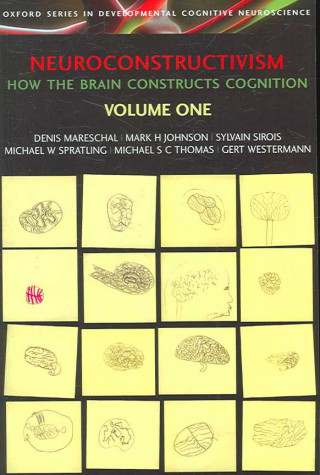
Doručení
Nákupní rádce





Nehodí se? Vůbec nevadí! U nás můžete do 30 dní vrátit
 Dárkový poukaz
V libovolné hodnotě
Dárkový poukaz
V libovolné hodnotě
S dárkovým poukazem nešlápnete vedle. Obdarovaný si za dárkový poukaz může vybrat cokoliv z naší nabídky.
Neuroconstructivism - I & II
 Angličtina
Angličtina
 403 b
403 b
30 dní na vrácení zboží
Mohlo by vás také zajímat


What are the processes, from conception to adulthood, that enable a single cell to grow into a sentient adult? The processes that occur along the way are so complex that any attempt to understand development necessitates a multi-disciplinary approach, integrating data from cognitive studies, computational work, and neuroimaging - an approach till now seldom taken in the study of child development. Neuroconstructivism is a major new 2 volume publication that seeks to redress this balance, presenting an integrative new framework for considering development. In the first volume, the authors review up-to-to date findings from neurobiology, brain imaging, child development, computer and robotic modelling to consider why children's thinking develops the way it does. They propose a new synthesis of development that is based on 5 key principles found to operate at many levels of descriptions. They use these principles to explain what causes a number of key developmental phenomena, including infants' interacting with objects, early social cognitive interactions, and the causes of dyslexia. The "neuroconstructivist" framework also shows how developmental disorders do not arise from selective damage to normal cognitive systems, but instead arise from developmental processes that operate under atypical constraints. How these principles work is illustrated in several case studies ranging from perceptual to social and reading development. Finally, the authors use neuroimaging, behavioural analyses, computational simulations and robotic models to provide a way of understanding the mechanisms and processes that cause development to occur. Computer and robotic models provide concrete tools for investigating the processes and mechanisms involved in learning and development. Volume 2 illustrates the principles of 'Neuroconstructivist' development, with contributions from 9 different labs across the world. Each of the contributions illustrates how models play a central role in understanding development. The models presented include standard connectionist neural network models as well as multi-agent models. Also included are robotic models emphasizing the need to take embodiment and brain-system interactions seriously. A model of Autism and one of Specific Language Impairment also illustrate how atypical development can be understood in terms of the typical processes of development but operating under restricted conditions. This volume complements Volume 1 by providing concrete examples of how the 'Neuroconstructivist' principles can be grounded within a diverse range of domains, thereby shaping the research agenda in those domains.
Informace o knize
 Angličtina
Angličtina




 Jak nakupovat
Jak nakupovat

























